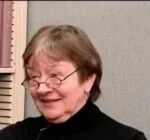Lyn H. Lofland, professor emerita in the department of sociology at UC Davis, died on Sept. 7, 2022.
Lyn grew up in Juneau, Alaska, and attended Stanford for a year before transferring to Antioch College in Yellow Springs, Ohio. Initially a student of history, she fell in love with the discipline of sociology during an introductory course and hastened to declare it as her major.
Having earned her bachelor’s degree in 1960, an era when it was uncommon for women to attend graduate school, Lyn worked as an administrative assistant and social worker for several years before enrolling at the University of Michigan. There she earned a master’s degree in 1966. She then joined the first cohort of doctoral students in the sociology program at UC San Francisco, where she knew she could develop her interests in symbolic interaction and premise her research on observational data.
Much of Lyn’s scholarship grew out of her love for big cities, something she first discovered in Chicago and later relished about living in San Francisco. The dissertation that she submitted to complete her Ph.D. in 1971 was published two years later as a monograph titled “A World of Strangers: Order and Action in Urban Public Spaces.” A foundational text among scholars of urban sociology and social interaction, the book is an analysis of how modern city dwellers navigate social spaces populated by strangers.
In “The Public Realm: Exploring the City’s Quintessential Social Territory,” published in 1998, Lyn expanded this focus to consider the layered nature of urban social spaces, challenging her reader to see how public life is organized to encompass private activities and personal meanings. In doing so, she established the public realm as a rich, standalone sphere of study.
Lyn’s writing balanced brilliant sociological insight with strict analytical discipline. She jettisoned rhetorical flourish in favor of clear-eyed description, a style that has given her work a timeless quality. This is particularly evident in her scholarship on death and dying, emotion, and grief. In between the publication of “World of Strangers” and “The Public Realm,” Lyn wrote “The Craft of Dying: The Modern Face of Death,” an examination of how people at the time were responding to the slow, medicalized forms of dying that have come to characterize end-of-life experience.
Originally published in 1978 but reissued in 2019, the text offers a trenchant critique of what Lyn called “The Happy Death Movement,” or the movement that gave rise to hospice care. So prescient was Lyn’s analysis that this book has reemerged as a touchstone for scholars of the death-positive movement today.
Shortly after joining the faculty at the UC Davis, Lyn developed the flagship course Self & Society and went on to teach courses in social interaction, urban sociology, and the sociology of death and dying. Early in her career she took special pleasure in lecturing to large groups of undergraduate students, jokingly referring to herself as a “showboat.”
Graduate students sought her out not only for her substantive knowledge but also for her expertise in qualitative methods. Her co-authored text “Analyzing Social Settings: A Guide to Qualitative Observation and Analysis” remains widely used in the graduate training of qualitative sociologists.
When it came to the political work of academe, Lyn could be a fierce and savvy advocate — “feisty” in the words of one colleague — and she worked on behalf of faculty in many ways and at many levels. Perhaps most notably, she chaired the department of sociology at UCD from 1996 to 1999, was president of the Pacific Sociological Association from 1989 to 1990, served as president of the Society for Symbolic Interaction from 1980 to 1981, and worked as the academic director for the Women’s Resources and Research Center at UCD from 1976 to 1978.
In notes of remembrance, Lyn’s students and colleagues describe her as a “treasure” and a “rarity,” a wise and honest mentor. We will remember her for her remarkable accessibility, generosity, interpersonal ease, and warmth. She will be dearly missed.

